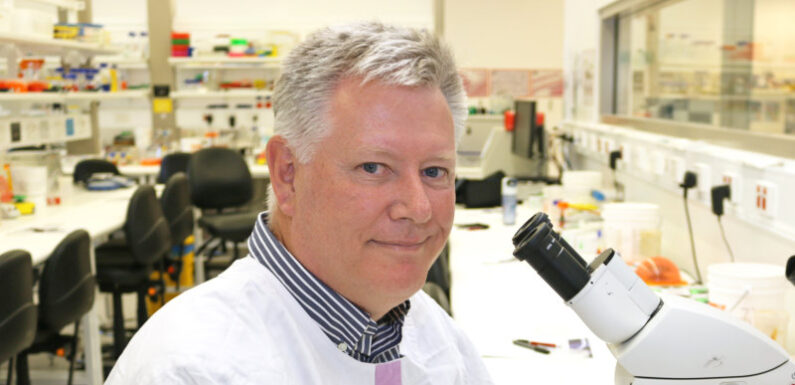
Save articles for later
Add articles to your saved list and come back to them any time.
Key points
- A report has called on the federal government to establish a scientific misconduct watchdog.
- Australia has a self-regulatory system, which critics argue allows universities to sweep misconduct under the rug.
- New documents show allegations of research misconduct can take months to be referred for investigation.
Australia must establish a watchdog to police its scientists, an inquiry into one of the country’s worst research misconduct scandals has found.
The proposed body would have the power to investigate allegations of research misconduct – such as falsifying data or running unethical experiments – and could directly sanction researchers found to have done the wrong thing.
An inquiry that investigated cancer researcher Mark Smyth, from the QIMR Berghofer Medical Research Institute, found that scientists and researchers needed to be policed by an independent body.
The finding, by former South Australian Independent Commissioner Against Corruption Bruce Lander, increases pressure on the federal government to finally establish the equivalent of the United States’ Office of Research Integrity.
A review of the Australian Research Council – which the government is still considering – recommended it be given a legislated role in policing research misconduct.
Lander was appointed by Brisbane-based QIMR Berghofer Medical Research Institute to investigate allegations of research misconduct and bullying by Professor Mark Smyth, one of Australia’s leading cancer scientists.
QIMR referred Smyth to anti-corruption authorities in 2021. He has never responded publicly to the allegations.
Professor Mark Smyth, the former head of immunology in cancer at the QIMR Berghofer Medical Research Institute.
Lander’s finding comes as documents, obtained by this masthead under freedom of information (FOI) laws, show it took months for a key government science agency to refer serious allegations of research misconduct for investigation.
Australia currently allows research institutions to police their own scientists. Lander found this created a huge conflict of interest at the heart of the system.
“It is not necessarily in the institution’s best interests for it to become known that someone within the institution has engaged in research misconduct,” Lander said in a supplementary report released to this masthead.
“There is a real disincentive for an institution to investigate its own researchers.”
Lander, also a former Federal Court judge, said a young researcher who witnessed a powerful senior professor committing research misconduct faced a terrible dilemma – to ignore the misconduct or report their boss to their employer.
That view won backing from another senior legal figure, Ian Freckelton, KC, on Monday. Freckelton, a barrister and a former judge of the Supreme Court in Nauru, wrote a book on research misconduct in 2019.
“The evidence for there being a problematic prevalence is overwhelming,” he said.
Universities had incentives to sweep cases of research misconduct under the rug, he said. “It is demoralising for colleagues. And it can be devastating for people who have blown the whistle.
“We are falling behind the rest of the world. We need to constitute such a body, with suitable powers, to undertake significant independent investigations into allegations of misconduct.”
Lander’s report revealed QIMR failed to respond to concerns about Smyth for seven years, and some whistleblowers were forced out of the organisation. QIMR had no research integrity office until 2018.
Six researchers complained directly to QIMR but were not “afforded the appropriate care, respect or credibility”, Lander found. Others were bullied by Smyth, Lander said.
Lander concluded Smyth was “a bully who used his reputation, status and power to intimidate” and avoid proper scrutiny of his research. Lander found Smyth could not have conducted all the experiments he claimed to have run.
FOI documents show an anonymous complaint about Smyth was made to the National Health and Medical Research Council in July 2020.
It took 10 days for the council’s director of ethics and integrity to respond. The director told the complainant the council had “no remit to independently investigate allegations of research misconduct”.
The council encouraged the complainant to raise the allegations directly with the institute.
It was not until September 2020 that the council notified the institute about the allegations.
At the time, the council’s assistant director of ethics and integrity was only part-time, and the council did not employ a permanent director of ethics and integrity.
The council defended the delay, saying it needed to seek further information from the complainant.
Smyth was contacted for comment on Monday.
Professor David Vaux, a leading scientific integrity campaigner, said the delay “showed that Australia is ill-equipped to handle concerns of possible research misconduct”.
“Looking at these [FOI] documents makes it even more clear that self-regulation by institutions does not work,” Vaux said.
The federal government has established an Australian Research Integrity Committee, but it is not allowed to investigate allegations of research misconduct – it can only review how institutes have handled allegations.
Education Minister Jason Clare said Australia had “a number of mechanisms currently in place to deal with research quality and integrity issues, including allegations of research misconduct”.
Our Breaking News Alert will notify you of significant breaking news when it happens. Get it here.
Most Viewed in National
From our partners
Source: Read Full Article

